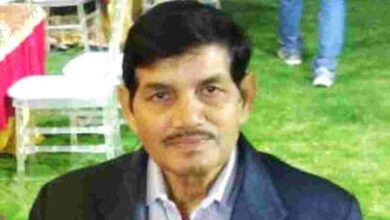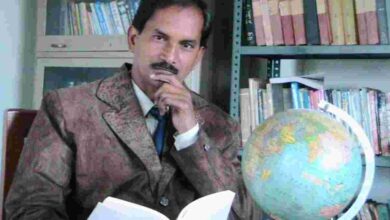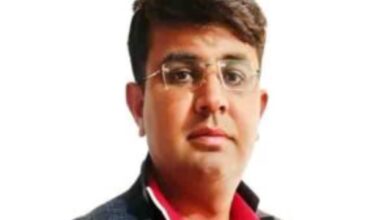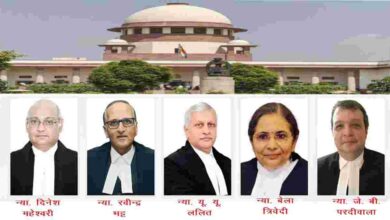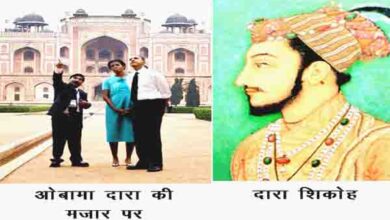”नेशनल हेरल्ड” : क्या गत बन गयी आज ! भाग – 2 neshanal herald : kya gat ban gayee aaj ! bhaag – 2

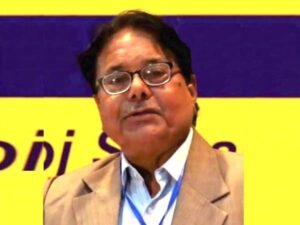
©के. विक्रम राव, नई दिल्ली
–लेखक इंडियन फेडरेशन ऑफ वर्किंग जर्नलिस्ट (IFWJ) के राष्ट्रीय अध्यक्ष हैं।
यूं तो हेरल्ड के इतिहास में खास-खास तारीखों की झड़ी लगी है, पर 9 नवम्बर 1998 मार्मिक दिन रहा। उससे दिन प्रथम सम्पादक स्वर्गीय श्री के.रामाराव की 102वीं जन्मगांठ भी थी। श्रम न्यायालय ने कर्मियों के बकाया वेतन के भुगतान हेतु हेरल्ड भवन की नीलामी का आदेश दिया था। लखनऊ के पुराने लोग उस दिन महसूस कर रहे थे कि मानों उनकी अपनी सम्पत्ति नीलाम हो रही हो। वह मशीनें भी थी, जिसे फिरोज गांधी अपने कुर्ते से कभी—कभी पोछते थे। वह फर्नीचर जिस पर बैठकर इतिहास का क्रम बदलने वाली खबरें लिखी गयीं थीं।
पिछले कई दशकों से हेरल्ड का दौर उत्तर प्रदेश और भारत के घटनाक्रम से अविभाज्य रहा है। इसकी शुरूआती कड़ी 1938 के गर्मी के मौसम की बनी थी। संयुक्त प्रान्त (तब यू.पी. का यही नाम था) में विधान सभा निर्वाचन में भारतीय राष्ट्रीय कांग्रेस को बहुमत मिल गया था। जवाहरलाल नेहरू ने सुझाया कि पार्टी को अपना दैनिक समाचार पत्र छापना चाहिए क्योंकि तब के अंग्रेजी दैनिक अंग्रेजों के समर्थक थे। एक कम्पनी पंजीकृत हुई। नाम रखा गया एसोसिएटेड जर्नल्स लिमिटेड।
नेहरू बने अध्यक्ष और निदेशक मण्डल में थे फैजाबाद जिले के आचार्य नरेन्द्र देव (प्रख्यात समाजवादी चिन्तक), बाराबंकी जिले के रफी अहमद किदवई (बाद में केन्द्रीय मंत्री), आगरा के श्रीकृष्ण दत्त पालीवाल (दैनिक सैनिक के सम्पादक), इलाहाबाद के राजर्षि पुरूषोत्तमदास टण्डन और डा. कैलाश नाथ काटजू, नैनीताल के गोविन्द वल्लभ पन्त, गंगाघाट, (उन्नाव), के एम.ए. सोख्ता और अमीनाबाद, लखनऊ, के मोहनलाल सक्सेना (बाद में केन्द्रीय मंत्री)। अब प्रश्न था सम्पादक कैसा हो? राष्ट्रवादी हो और वेतन के बजाय मिशन की भावना से काम करने वाला हो।
पहला नाम था पोथन जोसेफ का, जो तब दिल्ली में हिन्दुस्तान टाइम्स के सम्पादक थे और बाद में जिन्ना के मुस्लिम लीगी दैनिक ‘दि डाॅन’ के सम्पादक बने। उन्हीं दिनों अपने कराची अधिवेशन में राष्ट्रीय कांग्रेस ने तय किया था कि सारे कांग्रेसी सरकार के मंत्री सादा जीवन जियें और मासिक आय पांच सौ रूपये से अधिक नहीं लेंगे। पोथन जोसेफ खर्चीली आदतों वाले थे। पांच सौ रूपये वेतन कैसे स्वीकारते? हेरल्ड के सम्पादक को कांग्रेस मंत्री से अधिक वेतन देना वाजिब नहीं था। फिर नाम आया मुंबई दैनिक ‘दि फ्री प्रेस जर्नल’ के सम्पादक के. श्रीनिवासन का। वे कांग्रेस की विचारधारा के निकट नहीं थे। तब रफी साहब ने बाम्बे क्रानिकल के मशहूर सम्पादक सैय्यद अहमद ब्रेलवी से सुझाव मांगा।
ब्रेलवी के साथ युवा के. रामाराव काम कर चुके थे। ब्रेलवी ने रफी साहब से कहा कि नया अखबार है तो आलराउण्डर को सम्पादक बनाओ जो प्रूफ रीडिंग से लेकर सम्पादकीय लिखने में हरफनमौला हो। अतः रामाराव ही योग्य होंगे। तब वे दिल्ली में हिन्दुस्तान टाइम्स में समाचार सम्पादक थे। उन्हें इंटरव्यू के लिए रफी साहब ने लखनऊ के विधान भवन में अपने मंत्री कक्ष में बुलवाया। सवा पांच फुट के, खादीकुर्ता- पाजामा-चप्पल पहने उस व्यक्ति को कुछ संशय और कौतूहल की मुद्रा में देखकर रफी साहब ने पूछा कि ”आप वाकई में सम्पादन कार्य कर सकेंगें?“ रामाराव का जवाब संक्षिप्त था, ”बस यही काम मैं कर सकता हूं।“
फिर हेरल्ड के संघर्षशील भविष्य की चर्चा कर, रफी साहब ने पूछा, ”जेल जाने में हिचकेंगे तो नहीं?“ रामाराव हंसे, बोले, ”मैं पिकनिक के लिए तैयार हूं।“ बाद में 1942 में रामाराव को उनके सम्पादकीय ‘जेल और जंगल’ के लिए छह माह तक लखनऊ सेन्ट्रल जेल में कैद रखा गया था। रामाराव के सम्पादकीय सहयोगियों में तब थे: त्रिभुवन नारायण सिंह (बाद में संविद सरकार के मुख्यमंत्री और बंगाल के राज्यपाल), नेताजी सुभाष बोस के साथी अंसार हरवानी (बाद में लोकसभा सदस्य) और एम. चलपति राव। एक सादे समारोह में नेशनल हेरल्ड की शुरूआत हुई।
पूरी यू.पी. काबीना हाजिर थी। ये सारे मंत्री रोज शाम को हेरल्ड कार्यालय आकर खुद खबरें देते थे। वहाँ काफी हाउस जैसा नजारा पेश आता था। जवाहरलाल नेहरू भी खबरें देते थे।जनसभा में अपने भाषण की रपट को खुद आकर वे लिखते थे। उनका पहला वाक्य होता था: ”प्रमुख कांग्रेसी नेता जवाहरलाल नेहरू ने आज एक सार्वजनिक जनसभा में कहा“ ……आदि।
सीमित संसाधनों के कारण हेरल्ड कई संवाद समितियों’ की सेवा से वंचित रहता था। तभी की बात है शनिवार, 3 सितम्बर 1939 हिटलर ने ब्रिटेन पर युद्ध की घोषणा कर दी। अर्द्धसदी की यह सबसे बड़ी खबर थी। देर से आल इंडिया रेडियों ने सूचना प्रसारित की। नेहरू के जीजा (विजयलक्ष्मी के पति) आर.एस. पण्डित ने टेलीफोन पर हेरल्ड के सम्पादकीय विभाग को यह बात बतायी। रेडियों से खबर उदघृत करना कानूनी जुर्म था। संवाद समिति से यह खबर आयी नहीं थी।
उन दिनों रविवार को अखबार नहीं छपता था, अर्थात यदि उस शनिवार की रात युद्ध की खबर न छपती, तो अगला संस्करण तीन दिन बाद मंगलवार को होता। रामाराव ने खबर छाप दी। उधर दिल्ली में स्टेट्समैन ने भी यही किया। पुलिसिया तफतीश हुई। स्टेट्मैन के सम्पादक ने कहा कि पाठकों के प्रति दायित्व निभाने के लिए रेडियों से खबर लेना उचित था। हेराल्ड से जवाब तलब करने की हिम्मत ब्रिटिश शासन जुटा नहीं पाया।
part 2 of 3
continue……
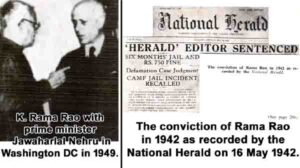
“National Herald”: What has become today! part 2

©K. Vikram Rao, New Delhi
The author is the National President of the Indian Federation of Working Journalists (IFWJ).
Although there is a flurry of special dates in the history of Herald, but 9 November 1998 was a touching day. The day was also the 102nd birth anniversary of the first editor Late Shri K. Rama Rao. The Labor Court had ordered the auction of Herald Bhavan for payment of the arrears of salary of the workers. The old people of Lucknow felt that day as if their own property was being auctioned. There were also machines, which Feroze Gandhi used to wipe occasionally with his kurta. The furniture on which the stories that changed the course of history were written.
For the past several decades, the Herald’s period has been inseparable from the developments in Uttar Pradesh and India. Its initial episode was made in the summer season of 1938. The Indian National Congress got a majority in the Legislative Assembly elections in the United Provinces (then the name of UP). Jawaharlal Nehru suggested that the party should publish its own daily newspaper as the English dailies of the time were pro-British. A company was registered. Named Associated Journals Ltd.
Nehru became the chairman and on the board of directors were Acharya Narendra Dev (eminent socialist thinker) of Faizabad district, Rafi Ahmed Kidwai (later Union Minister) of Barabanki district, Shri Krishna Dutt Paliwal (editor of Dainik Sainik) of Agra, Rajarshi Purushottamdas Tandon of Allahabad. and Dr. Kailash Nath Katju, Govind Vallabh Pant of Nainital, Gangaghat, (Unnao), K.A. Sokhta and Mohanlal Saxena of Aminabad, Lucknow (later Union Minister). Now the question was how is the editor? Be nationalistic and work with the spirit of mission rather than salary.
The first name was that of Pothan Joseph, who was then the editor of Hindustan Times in Delhi and later became the editor of Jinnah’s Muslim League daily ‘The Dawn’. On those days, the National Congress in its Karachi session had decided that all the ministers of the Congress government should lead a simple life and would not take a monthly income of more than five hundred rupees. Pothan Joseph was a spendthrift. How to accept five hundred rupees salary? The editor of the Herald was not justified in paying more than the Congress minister. Then came the name of the editor of Mumbai daily ‘The Free Press Journal’. of Srinivasan. He was not close to the ideology of Congress. Then Rafi Sahab sought suggestions from the famous editor of the Bombay Chronicle, Syed Ahmed Brelvi.
Young K. with Brelvi. Rama Rao had worked. Brelvi told Rafi sahib that if there is a new newspaper, then make an all-rounder editor who is an all-rounder from proof reading to editorial writing. So only Rama Rao would be eligible. Then he was the news editor of Hindustan Times in Delhi. He was called for an interview by Rafi Sahab to his ministerial room in the Vidhan Bhawan, Lucknow. Rafi Sahab, seeing a five-and-a-half-foot man, dressed in khadikurta-pajama-slippers, asked, “You can really do the editing work?” Am.”
Then discussing Herald’s struggling future, Rafi Sahib asked, “Will you hesitate to go to jail?” Rama Rao laughed, saying, “I am ready for a picnic.” Later in 1942, Rama Rao was referred to as his editorial ‘Jail and Jungle’. He was imprisoned in Lucknow Central Jail for six months. Rama Rao’s editorial colleagues were then: Tribhuvan Narayan Singh (later Chief Minister of the Sanvid government and Governor of Bengal), Netaji Subhas Bose’s colleague Ansar Harwani (later Lok Sabha member) and M. Chalapati Rao. The National Herald was launched in a simple ceremony.
Whole U.P. Cabina was there. All these ministers used to come to the Herald office every evening to give news themselves. There was a very house-like view. Jawaharlal Nehru also used to give news. He himself used to come and write the report of his speech in the public meeting. His first sentence was: “Prominent Congress leader Jawaharlal Nehru said in a public meeting today” …etc.
Due to limited resources, Harald was deprived of the service of many dialogue committees. It was then that on Saturday, 3 September 1939, Hitler declared war on Britain. This was the biggest news of half a century. Of late All India Radio broadcast the information. Nehru’s brother-in-law (Vijayalakshmi’s husband) R.S. The Pandit told this over the telephone to the editorial department of the Herald. It was a legal offense to cite news from the radio. This news did not come from the dialogue committee.
In those days the newspaper was not published on Sundays, that is, if the war news had not been published on that Saturday night, the next edition would have been three days later on Tuesday. Rama Rao printed the news. On the other hand, the Statesman did the same thing in Delhi. Police investigation took place. Statesman’s editor said that it was appropriate to take news from the radio in order to fulfill the obligation to the readers. The British rule could not muster up the courage to call for an answer from the Herald.
part 2 of 3
continue……
”नेशनल हेरल्ड” : क्या गत बन गयी आज ! भाग- एक neshanal herald : kya gat ban gayee aaj ! bhaag- ek




